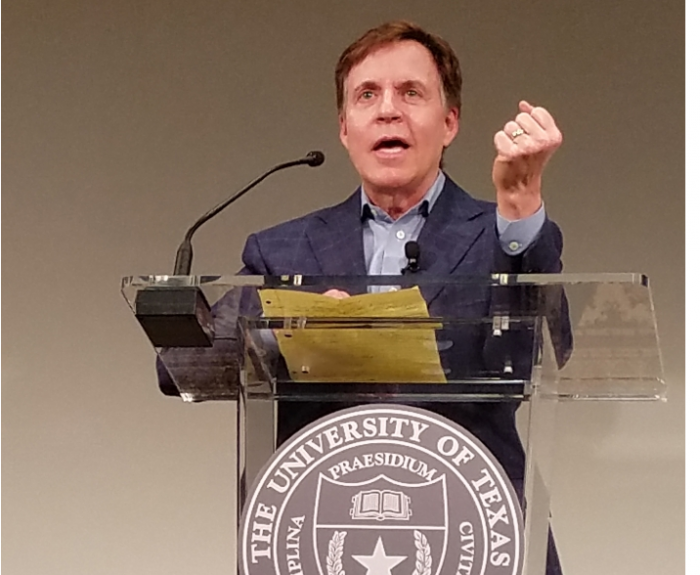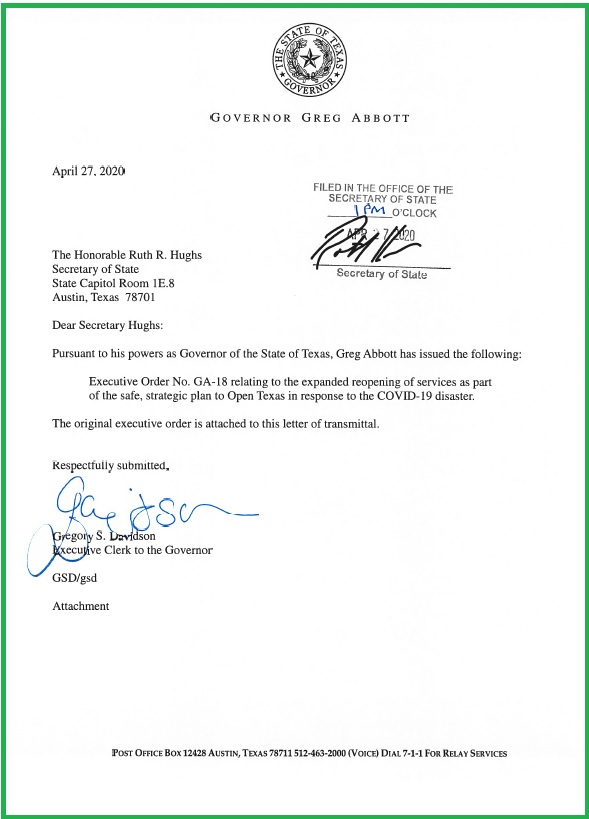Costas decries 'click-bait' culture of modern media

Bob Costas speaks to UT students and faculty while giving the ninth annual Frank Deford Lecture in Sports Journalism at Moody College of Communications.
By Lew K. Cohn
Managing Editor
The Highlander
Few journalists have credentials as impressive as NBC sportscasting legend Bob Costas, so when the 66-year-old New York native speaks about the current state of news media and sports — as he did Monday at the University of Texas at Austin — people listen.
Costas was at the Moody College of Communications' Belo Center for New Media to give the ninth annual Frank Deford Lecture in Sports Journalism to a capacity crowd of students, staff and the public. I was privileged to have the opportunity not only to attend the lecture, but to ask Costas a question of my own and to speak with him briefly afterwards.
Costas — the only person to have ever won Emmys in news, sports and entertainment — told UT students and staff that he was “impressed by the facilities, by the faculty members I've met and by the students I've met” during his visit to the Forty Acres.
Never one to shy away from telling it like it is, Costas decried the “click-bait” culture embraced by modern media, especially social-media savvy special interest publications, while pointing out there are still many of his colleagues who perform with honor and integrity.
“For modern media, there's still a whole lot of quality out there, a whole lot,” Costas said. “There really is an idea that, even as styles change and technology changes and the way in which we consume information changes, that there are certain lasting truths that have to be upheld. There are barbarians at the gate and they've got to be held off.
“We've got to hold our ground who believe that whatever they want to be true is true, and whatever they don't want to be — no matter what the evidence of it is — is there for untrue. As someone recently said, we now live in the world where everything is true and nothing is true. You can go to your own respective corners and you can have whatever your predisposition — whatever your pre-existing bias is confirmed and amplified, and you can go to another corner and have an entirely different point of view confirmed and amplified.”
Costas noted, throughout his career, he would read conservative and liberal columnists alike to make sure he had a broad viewpoint of the world so as not to become too set into a pre-conceived idea about a particular issue.
“If I read George Will or Peggy Noonan from a conservative viewpoint, I did not think they were lying or tilting facts or creating 'click-bait headlines' to influence people in a dishonest way,” Costas said. “I thought they were seeing the world and seeing objective facts with integrity, and in their mind, fairness, but just from a conservative perspective.
“If, on the same issue, I read Nicholas Kristof or someone from Mother Jones or The New Republic, I didn't think they were lying to me. I thought they were trying to give me an informed take from their perspective.”
The 28-time Emmy winner and longtime host of NBC's coverage of the Olympic Games told students that today the American public “are being actively not just uninformed, but in too many cases, actively and purposefully misinformed, because it is the business model of much of modern media to heighten the resentments of their core audience.”
“Shades of gray don't serve any purpose,” Costas said. “You seldom hear anymore, over here in the left corner or over in the right corner, things like, 'My esteemed colleague makes a number of good points, but here is where I differ' or 'I can see that point, given the integrity and the honesty of the good intentions of Mr. Smith or Mrs. Jones, but I still disagree and here's why.'”
Instead, Costas said, in today's media, when someone disagrees with another person, “you're not just wrong on the merits, and it's not just my job to try and prove that I have a better argument or more persuasive argument on the merits.”
“I am at liberty to misrepresent what you say, to extrapolate from that misrepresentation a whole constellation of beliefs that make it easier to turn you into a strawman, and then, while I am at it, I can demonize you as a person,” he said. “That accounts for a huge portion of the divisiveness that we see in this country.”
Costas spoke at length about his 40-plus year career in sports journalism, including:
* his coverage of the Major League Baseball steroid scandal of the late 1990s and early 2000s;
* the undeniable proof of the link between concussions and chronic traumatic encephalopathy (CTE) in all levels of football (Costas was one of the first sportscasters not only to talk about the large number of NFL players suffering from CTE, but to interview the medical researchers who identified this link);
* his decision to honor the families of the 12 Israeli athletes and coaches killed in the 1972 Munich Games with a moment of silence at the 2012 London Olympics;
* and the continuing controversy about Colin Kaepernick and other professional athletes kneeling for the national anthem to protest perceived racial injustice by law enforcement.
Costas encouraged the students present to read the works of Frank Deford, the late Sports Illustrated writer who gave the first lecture in the series and for whom the lecture series is named.
I asked him if he had experienced “ageism” in his field now that he has grown long in the tooth as a broadcaster, but he replied he had not. Costas confirmed he had stepped down from coverage of this year's Super Bowl and Olympics not because of his age, but due to his own ambivalence towards professional football and a desire to seek out other arenas to conquer.
Costas also gave the audience a treat by showing the 1958 Mickey Mantle Topps baseball card he keeps in his blazer pocket — a nod to his beloved New York Yankees. After all, it was time spent at Yankee Stadium with his father at baseball games which helped steer a young Bob Costas to his future career.
“I knew there was no way I was ever going to play in Yankee Stadium, so the only way I was going to be able to see games there for free was to cover sports and I have been privileged to be able to do just that,” Costas said.






